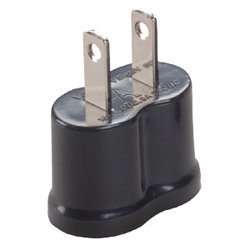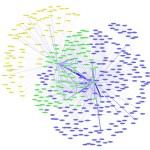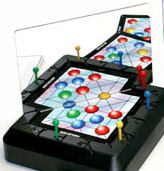Using Technology to Supercharge Kid’s Creativity
 Children are naturally creative. Very creative. As parents we want to enhance our kid’s creativity and make sure that it gets carried forward into adulthood. One tool that aspires to do that is the iPad App Toontastic from Launchpad Toys. Kids draw free style and move around a number of characters (e.g. pirates, queens, monkeys) and narrate a story as they play. All the while the App records what they do and compiles it into a cartoon that can be shared online with friends. So far they have 600,000 story tellers from 150 countries that have made more than 2 million cartoons.
Children are naturally creative. Very creative. As parents we want to enhance our kid’s creativity and make sure that it gets carried forward into adulthood. One tool that aspires to do that is the iPad App Toontastic from Launchpad Toys. Kids draw free style and move around a number of characters (e.g. pirates, queens, monkeys) and narrate a story as they play. All the while the App records what they do and compiles it into a cartoon that can be shared online with friends. So far they have 600,000 story tellers from 150 countries that have made more than 2 million cartoons.
While Launchpad Toys does not claim that the App will improve creativity they designed it to do just that. The company argues we are in a creativity crisis by pointing out that creativity scores have been dropping since 1990 (especially in kids 5-12 years old) just when society and the workplace needs innovation the most.
I am interested to hear from readers that are using Apps to improve cognitive performance in kids.
Categories: Child, Problem Solving Tags: creativity
Bilingual Kids Can Have Mental Advantages
 I get emails from parents interested in hearing about evidence-based ways to improve their children’s brain function and cognitive performance. So I am always on the lookout for scientific studies that suggest Next Brain development ideas for kids. That’s why a university study from Scotland caught my eye. Researchers there found that children speaking two languages (bilingual) can have more mental agility than those that don’t. More specifically:
I get emails from parents interested in hearing about evidence-based ways to improve their children’s brain function and cognitive performance. So I am always on the lookout for scientific studies that suggest Next Brain development ideas for kids. That’s why a university study from Scotland caught my eye. Researchers there found that children speaking two languages (bilingual) can have more mental agility than those that don’t. More specifically:
“Our study has found that it can have demonstrable benefits, not only in language but in arithmetic, problem solving and enabling children to think creatively. We also assessed the children’s vocabulary, not so much for their knowledge of words as their understanding of them. Again, there was a marked difference in the level of detail and richness in description from the bilingual pupils.”
The children in the study were around age nine and the bilinguals spoke Italian and English. It is important to note that they do not claim that learning a second language will produce these cognitive improvements. But is is suggestive.
Interested to hear from readers that live in a bilingual household or that have extensive second language experience. How does it enrich your language skills and thinking abilities?
Categories: Child, Cognitive Development, Problem Solving, Training Tags:
Rosemary Scent Boosts Mental Speed & Accuracy
 I am often asked if aromas or scents improve brain function and enhance cognitive performance. Several previous posts on the Next Brain blog have highlighted peppermint, cinnamon, vanilla and citrus. Now, new research shows a link between aroma generated by rosemary oil and improved speed and accuracy in analytic and visual tasks. Rosemary contains an ingredient that impacts our neurochemistry. In the experiment the more of this ingredient that was absorbed the greater the chance of improved cognitive performance.
I am often asked if aromas or scents improve brain function and enhance cognitive performance. Several previous posts on the Next Brain blog have highlighted peppermint, cinnamon, vanilla and citrus. Now, new research shows a link between aroma generated by rosemary oil and improved speed and accuracy in analytic and visual tasks. Rosemary contains an ingredient that impacts our neurochemistry. In the experiment the more of this ingredient that was absorbed the greater the chance of improved cognitive performance.
For more information you can read the research article in the journal of Therapeutic Advances in Psychopharmacology or a another blog post.
Interested to hear from readers that use rosemary and other aromas to boost alertness, focus, processing speed, mood or other cognitive factors.
Categories: Ancient Ways, Mental Focus, Other, Problem Solving Tags:
Rapidly Generate Creative + Constructive Ideas
The ability to think creatively often comes down to changing the mental frame you are using to interpret a problem or situation. But how can we reframe? Recent research from the University of Massachusetts offers some techniques and claims Anyone Can Learn to be More Inventive. They studied:
“… more than 100 significant modern and 1,000 historical inventions, McCaffrey analyzed how successful inventors overcame various cognitive obstacles to uncover the key obscure information needed to solve problems. “
They offer two practical ideas involving the use of:
 The generic-part technique where you describe the features of an object without reference to their functions. For example, in describing the features of a electrical plug you might note it has two flat metal pieces. This helps you imagine potential new uses, for instance, as a screwdriver. By focusing on size, shape, material and other intrinsic properties we open up the frame we are using to understand the plug’s functionality.
The generic-part technique where you describe the features of an object without reference to their functions. For example, in describing the features of a electrical plug you might note it has two flat metal pieces. This helps you imagine potential new uses, for instance, as a screwdriver. By focusing on size, shape, material and other intrinsic properties we open up the frame we are using to understand the plug’s functionality.
 The thesaurus technique where you describe your goal or an aspect of the problem using a thesaurus. A thesaurus lists related terms which naturally cause us to think in different ways. A good thesaurus lists far more synonyms than we can think of by ourselves. For example, you might be working on a project that involves fastening or attaching one thing to another. A search for fasten on a good thesaurus generates 60+ synonyms and related words. Far more than we can brainstorm. It is also instructive to look at the antonyms or words that mean the opposite. They can trigger new ideas as well.
The thesaurus technique where you describe your goal or an aspect of the problem using a thesaurus. A thesaurus lists related terms which naturally cause us to think in different ways. A good thesaurus lists far more synonyms than we can think of by ourselves. For example, you might be working on a project that involves fastening or attaching one thing to another. A search for fasten on a good thesaurus generates 60+ synonyms and related words. Far more than we can brainstorm. It is also instructive to look at the antonyms or words that mean the opposite. They can trigger new ideas as well.
These techniques work. They are simple ways to change your mental frame and generate a good number of new and constructive ideas.
Categories: Problem Solving, Training Tags:
Gift Giving Idea: Consider Fat Brain Toys
 Fat Brain offers an amazing collection of high quality toys and entertainments designed to stimulate the brain and develop cognition. You can shop for toys by gender and ages ranging from 1 year old to 18 years old. From magnetic poetry and brain food (colorful goo) to the best selling stomp rockets and reflections (image shown), a truly unique game that combines mirrors, visual illusion and competition.
Fat Brain offers an amazing collection of high quality toys and entertainments designed to stimulate the brain and develop cognition. You can shop for toys by gender and ages ranging from 1 year old to 18 years old. From magnetic poetry and brain food (colorful goo) to the best selling stomp rockets and reflections (image shown), a truly unique game that combines mirrors, visual illusion and competition.
Just the kind of toys that should be on the holiday shopping list of Next Brain Blog readers. Interested to hear from anyone that has purchased or plays with Fat Brain Toys. How are they making you smarter?
Categories: Child, Cognitive Development, College Student, Mental Focus, Other, Perception, Problem Solving Tags: toys
Can Singing Significantly Improve Brain Function?
 The answer is yes according to the makers of SingFit an App for the iPhone and iPad that is due out in just a couple of weeks. Grounded in well-established principles from music therapy they claim:
The answer is yes according to the makers of SingFit an App for the iPhone and iPad that is due out in just a couple of weeks. Grounded in well-established principles from music therapy they claim:
“Scientific studies have shown that singing in general positively impacts the levels of hormones responsible for regulating mood, blood pressure and social bonding, including serotonin, cortisol and oxytocin. Furthermore, singing has been proven to help increase immune system strength and respiratory function while decreasing stress, pain and agitation. Imaging studies also reveal that singing can promote cross hemisphere brain activity, which can increase mental neuroplasticity and improve cognitive functioning.”
The app is free but they hope to sell you a $13 a month subscription for more content. I’d like to hear from readers that use this app or other forms of music therapy to build brain function and improve cognitive performance.
Categories: Ancient Ways, Memory and Learning, Music and Audio, Problem Solving, Sleep Tags:
Will Playing Video Games Boost Kid’s Creativity?
 The answer is yes according to recent research at Michigan State University. They studied 500 12-year-olds and found that playing video games increases creativity when it comes to drawing pictures and writing stories. The finding is robust:
The answer is yes according to recent research at Michigan State University. They studied 500 12-year-olds and found that playing video games increases creativity when it comes to drawing pictures and writing stories. The finding is robust:
“… regardless of gender, race or type of game played by the students, the study found a relation between video game playing and greater creativity.”
They also found no increase in creativity through the use of computers, the Internet or smart phones.
Interested to hear from readers that include video game playing in an effort to develop their children’s brain function and cognitive performance.
Categories: Child, Problem Solving, Software Tags: creativity, games
21st Century Problem Solving Skills for Students
 For more than 25 years Designation ImagiNation has delivered an after school experience that builds creativity, critical thinking and collaborative problem solving skills in k-12 and university level students in more than 30 countries. Students form small teams of 2-7 members, select an open-ended challenge, learn to generate and test creative solutions and then compete in tournaments. They reach over a 100,000 students a year and the tournaments are a significant event. Check out the 2011 global finals. I’ve included a photo (to the right) from the opening ceremonies in this post.
For more than 25 years Designation ImagiNation has delivered an after school experience that builds creativity, critical thinking and collaborative problem solving skills in k-12 and university level students in more than 30 countries. Students form small teams of 2-7 members, select an open-ended challenge, learn to generate and test creative solutions and then compete in tournaments. They reach over a 100,000 students a year and the tournaments are a significant event. Check out the 2011 global finals. I’ve included a photo (to the right) from the opening ceremonies in this post.
Some challenges include:
- Deliver a theatrical performance on the use of solar energy
- Create a movie trailer with characters from at least two nations
- Design and build a wooden and glue structure that can hold a heavy weigh
Here is the pitch:
“By participating in the team-based competitive program, children can achieve lifelong benefits, improve self confidence, and learn the creative problem solving process and develop critical thinking skills.”
There are plenty of opportunities to start a team, sponsor a team or volunteer.
Interested to hear from readers that have participated in the program. How are they teaching creativity and critical reasoning skills?
Categories: Child, Problem Solving Tags:
Brain Training With Riddles – Does it Work?
 Working riddles makes you to think. Often you have to think hard or in new ways. Riddles are good at teaching us how to reframe a context, probe deeply on small clues, invert our assumptions and other problem solving heuristics. Some claim they are a great brain training tool. For example, I recently came across Riddles Improve Brain Functionality, Translate to Real-Life Problem Solving Skills, that claims:
Working riddles makes you to think. Often you have to think hard or in new ways. Riddles are good at teaching us how to reframe a context, probe deeply on small clues, invert our assumptions and other problem solving heuristics. Some claim they are a great brain training tool. For example, I recently came across Riddles Improve Brain Functionality, Translate to Real-Life Problem Solving Skills, that claims:
“A daily dose of riddles and brain teasers is one of the most effective ways to exercise the mind. It is proven that by spending just a few minutes a day “playing” improves memory, concentration and reaction time. This improved brain power translates into being more efficient as a parent, student, employee or boss.”
While I have yet to find a scientific study that supports the claim that working riddles significantly improves cognitive performance on everyday tasks, it does seem reasonable.
Try some out. Riddlesly (source of the quote above) is a popular site. Or for $15 you can get visual brainstorms from Marbles the brain store. Visual brainstorms is a deck of 100 cards with riddles of various types of levels.
Interested to hear from readers that use riddles as part of their Next brain training program.
Categories: Memory and Learning, Problem Solving Tags:
Walnuts Boost Critical Thinking Skills By 11%
 Researchers at Andrews University have found a potential connection between eating walnuts and improved critical reasoning skills in young adults. They published their findings in the British Journal of Nutrition. The bottom line:
Researchers at Andrews University have found a potential connection between eating walnuts and improved critical reasoning skills in young adults. They published their findings in the British Journal of Nutrition. The bottom line:
“Students consuming walnuts showed a significant improvement in inference after consuming one-half cup of walnuts daily for eight weeks,” says Pribis. “Walnuts will obviously not make you a critical thinker; this comes after years of studying. However, students and young professionals in fields that involve a great deal of critical thinking or decision-making could benefit from regularly eating walnuts.”
Significant improvement in this case means scoring 11% higher on a verbal inferential reasoning task. Walnuts were ground up and consumed by having two sliced of banana bread every day.
We have reported on additional claims that walnuts provide a cognitive boost elsewhere on the Next Brain blog
I am interested to hear from readers that use walnuts to improve brain function or cognitive performance. How many do you eat and how often? How do you consume them – raw or as an ingredient in some other food?
Categories: Cognitive Decline, College Student, Diet, Problem Solving Tags:

